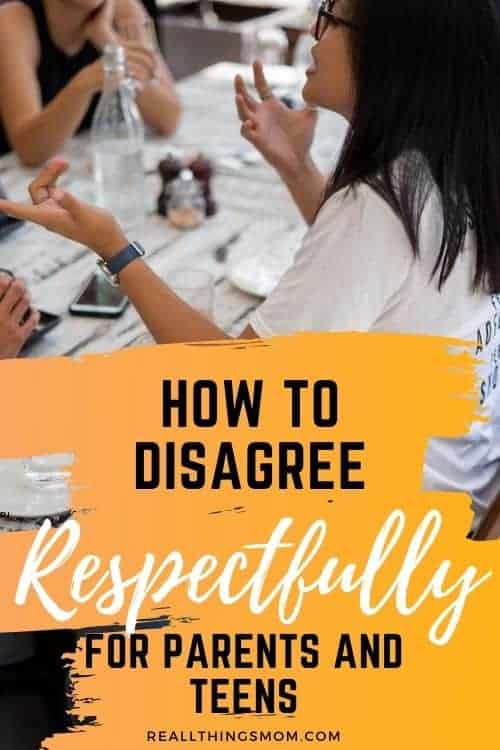
There is something I hate—unresolved disagreements. Sometimes disagreements just take time to resolve…and I’m not great at waiting. Of course, just like any child, my children often disagree with their parents—especially teenagers. Some teenagers have a more disagreeable personality than others—particularly strong-willed children who just enjoy a good round in the ring! And while this can be frustrating for parents, teaching your children how to disagree is important!
One of my teenagers went through a stage in which he argued about everything. He argued when there was nothing to argue about! If I said, “Hey, I like that shirt on you!” He would reply with something like, “Well, I don’t.”
He learned quickly, though, that arguing, especially when it came to consequences for choices, only got you more consequences. So, he shut his mouth.
I commend him for the self-control that he exercised; however, he very visibly disagreed. Sure, he would shut his mouth…for a time. But eventually, it would all come spewing out…and when it did, it usually came out as an explosion.
So, now, I’m in the position of helping him understand that when you’re a teenager, you can disagree with your parents. In fact, if you never disagree, I will be worried for you. And moms, we are sending our children into a world in which disagreement is censored and restricted to a ridiculous and unhealthy degree!
We need to be teaching our children that disagreement is not bad. Disagreement, when expressed respectfully, often leads to great things! We need to teach our children how to disagree!
How to Disagree–5 Must-Knows for Teens and Parents
- Parents Are Wrong Sometimes—
Yep. It happens. And quicker you can accept that being wrong is possible, the stronger the relationship you’ll end up having with your children.
When I was in ninth grade, I played the flute in the high school band; however, for several legitimate reasons, I wanted to switch to the tuba. When I asked my parents about the switch, they immediately said, “No.”
I argued. A big, blown-up disagreement ensued and I can guarantee I did not communicate my disagreement respectfully! I cried myself to sleep that night. I’m sure that to most of you, it seems like it wouldn’t be worth that kind of emotional anguish. It’s a tuba.
Believe me. The mom in me hears you! But the teenager in me, then, saw it as a broken dream. An aspiration that came at absolutely zero expense to my parents, but for some reason, they wouldn’t even entertain the idea of me pursuing this “dream!”
Thankfully, I have humble parents. They discussed it further, slept on it, and by the next day, they were ready to consider it, and before long, I was tootin’ on the sousaphone in the garage!
Understanding that, as a parent, sometimes your perspective is wrong, is a great first step in teaching your children to disagree respectfully. Sure, to my parents it was just a tuba. To me, it was much more than that! I loved playing the tuba and it ended up opening up far more opportunities with the band than I ever could have had as a flautist. And that disagreement is the one that stands out in my mind the most not because of its subject matter, but because of how important it was to me.
Remember that with your teen. What might seem unimportant to us could mean the world to them! So, say “Yes” when you can and try to remember what it was like to be fourteen!
- You Don’t Have to Agree, but You Must Be Respectful—
One of the things I’m most grateful for in how I was raised is the fact that my parents taught us to think for ourselves and to not take every idea we were taught in school as truth.
I had plenty of teachers who did not teach truth. In fact, in high school, I had a teacher who docked students’ grades because of a discrepancy between his political stance and theirs (including mine!) My parents taught me, from a young age, that I didn’t need to agree with everything my teacher taught, but I must always show respect to authority.
And my parents practiced what they preached! They also backed us up on any convictions we had that aligned with being Biblical. For example, when I was in second grade, my teacher read a book aloud to us that used profanity. In SECOND GRADE! I remember being so uncomfortable about it and when I told my parents, they called the teacher and politely discussed their options. They didn’t yell at her or berate her. They simply communicated that they didn’t want me participating in that part of class. When it came down to it, she continued to read the book to the class, but skipped any inappropriate parts.
My disagreement with my teacher, and my parents’ response to it, actually produced a better learning environment for all of the students in that situation! It is okay for a child to disagree!
- Use Respectful Language—
Remember that our children are naturally wired for sin. This means that communicating using respectful language will not happen unless we teach them the language to use. I frequently use the, “I feel _______ when you ________” model because it’s easy to teach and keeps the accusations to a minimum on both sides of a disagreement. Overall, it’s simple, and fairly effective.
- Tone and Body Language—
You have probably all read or heard the numbers 55/38/7…or maybe I’m the only one who grew up hearing these numbers! If you’re not familiar, the theory is that 55% of how you communicate is through body language; 38% is through tone of voice; and only 7% is actually through the words you say.
There is definitely some back and forth on whether or not these numbers are accurate (because how could you really know?), but the bottom line stays the same.
Teach your children from a young age that an eye roll is not acceptable! Teach your children that walking away from you while you’re talking communicates disrespect.
My dad actually went through these numbers with me at one point, and then whenever he saw things escalating between my mom and me, he would simply say, “Tone and body language.” It.was.SO ANNOYING!!
But I am far more aware of my tone and body language than I would have been without the constant reminders!
- “I Don’t Owe You an Explanation”-
Aaah. The “Because I said so” parent. I was never going to be that! I also was a perfect parent before I had children. Things change! There are times when children, particularly teenagers, argue for the sake of argument; have absolutely zero desire to actually listen to reasoning; (okay, this sounds like adults right now too!) and will not benefit from a politely communicated disagreement.
These are the cases that can escalate quickly if you’re not on your best game!
In these situations with my teenagers, I try to remember to simply say, “I don’t owe you an explanation.” End of discussion. Of course, that won’t end it for your teen, but if you can calmly reply, “I don’t owe you an explanation,” repeatedly, it will end a lot more quickly than if you continue to engage in debate.
There is a time and a place for this, and if you allow your children to communicate disagreement with you most of the time, it will be quite powerful when you do have to use this one.
Ladies, let’s not shy away from disagreement—with our peers, our spouses, or with our children. It’s a healthy thing! Instead, let’s communicate our views with respect and teach our children to do the same! We can do this!
RElated: Teaching Kids Respect for Authority
